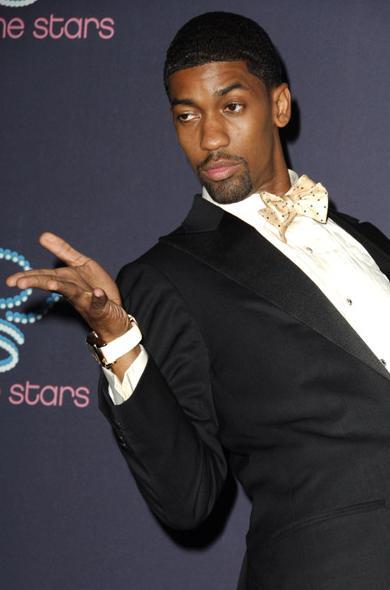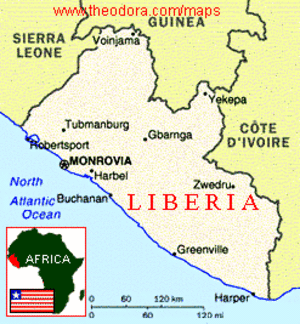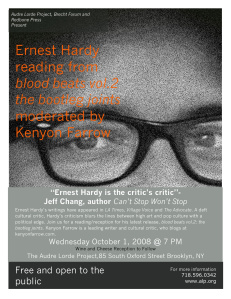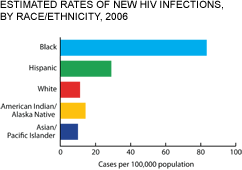Monthly Archives: September 2008
Wanda Sykes on Palin, Economy
NBC Yanked the videos from Youtube, the proprietory bastards. But here it is from The Tonight Show’s website.
Blacks, Gay Men At Highest Risk for HIV
The US Conference on AIDS has begun in Fort Lauderdale, unfortunately I couldn’t afford to go, but just as well because I am going to see my southern friends at Southerners on New Ground’s 15th Anniversary. But given the CDC’s recent release of the of the subpopulation data of the new infections for 2006 (called incidence), I thought I’d share some of the data with you. If you click on the link above you’ll find a lot of other tools to help you understand the data including a fact sheet, a Q&A, and a podcast:
CDC’s August 2008 data showed that gay and bisexual men, referred to in CDC’s surveillance systems as men who have sex with men (MSM)2, represented the majority of new infections in 2006 (53%, 28,720).
Now, in the more detailed analysis, CDC further examine new infections among whites, blacks, and
Hispanics/Latinos. The findings reveal that the ages at which MSM become infected vary by race:
- Young Black MSM: Among MSM overall, there were more new HIV infections in young black MSM (aged 13–29) than any other age/racial group of MSM. The number of new infections among young, black gay and bisexual men was roughly twice that of whites and of Hispanics/Latinos (5,220 infections in blacks vs. 3,330 among whites and 2,300 among Hispanics/Latinos).
- White MSM in their 30s and 40s: Among MSM in the analysis, white MSM accounted for close to half (46%) of HIV incidence in 2006. Most new infections among white MSM occurred in those aged 30–39 (4,670), followed by those aged 40–49 (3,740).
- Hispanic/Latino MSM: Among Hispanic/Latino MSM, most new infections occurred in the youngest (13-29) age group (2,300), though a substantial number of new HIV infections were among those aged 30–39 (1,870)
Walt Senterfitt, in this month’s HHS Watch (a publication of Community HIV/AIDS Mobilization Project (CHAMP)), writes about what the new data means for gay men in his piece called Where’s Our National Campaign Against Homophobia?
There has also been a consistent tendency over at least the last 15 years within much of the AIDS community itself – and certainly by the media and other institutions of civil society enlisted in the struggle against HIV/AIDS – to “de-gay-ify” HIV/AIDS. For example, messages stress that HIV is an “equal opportunity virus” and that anyone can be at risk, emphasize children and women at risk, and stress that HIV/AIDS is, in its majority, now an epidemic in communities of color (while simultaneously neglecting to stress that those most disproportionately impacted in communities of color are gay and bisexual men).
This direction in messaging was in part well intended, to combat the widespread assumption that if you are not a white gay man, AIDS is not your problem and you are not at risk. It was also meant to get beyond the intensified stigmatization of gay men and focus on the behaviors that put one at risk. This approach has been embraced by many HIV positive and other gay men who fear the added stigmatization of having “gay” remain widely associated with “HIV/AIDS” in public consciousness. Even from the start though, this approach was a capitulation to rather than a confrontation of societal stigma and prejudice against gay people, against transgender people, against all people who are sexually “non-normative.” And it didn’t work. Homophobia still is rampant, dollars have gone elsewhere, and, alone among the exposure categories, HIV infection rates among gay men are rising.
Here’s video from a panel CHAMP sponsored (that I moderated) back in February on the issue:
[youtube=http://www.youtube.com/watch?v=ObFD-VwNFCg]
Listen Up!: New Labelle Single "Roll Out"
“Roll Out,” the lead single from Labelle’s first new studio album in over 30 years, represents just one dimension of the group’s genre-bending sound. The modern mid-tempo dance track produced by and featuring Wyclef Jean (and Jerry ‘Wonda’ Duplessis) highlights bouncing synth drumbeats and soaring vocals that deliver an empowering message to women. The single is from the upcoming Labelle recording, “Back to Now” to drop on October 21 on Verve Records.
From their formation in 1961 at the dawn of the girl-group era, through their pioneering years fusing rock, soul, and funk, Labelle’s innovation has set them apart in a genre all their own. With additional production by Gamble & Huff and Lenny Kravitz, ‘Back to Now’ embodies everything Labelle has ever been.
How the Labelle Reunion Came About:
After Nona found a song that was a tribute to civil rights leader Rosa Parks, “I asked Pat about us doing it as a group. Pat’s been talking about us getting back together for thirty years! I said, ‘we should either stop announcing it…or do it!’” For Patti, the idea of coming back together to record and tour was all about timing: “Every time it came up, I was working. I knew it was long overdue but each time, I was not ready to do it and I had so many things on my plate. My manager Damascene Pierre Paul kept asking me to do do this; he was begging me and finally, I gave in. Then I said, ‘I don’t want to half-step…I will make time to do this.” Adds Sarah, “We’d been talking about it and we had a meeting in 2007 to see what we could put in motion. We never did a farewell tour. We just stopped. This is a way of bringing completion for the fans who were with us from the beginning.”
The result of what Nona likes to call the trio’s “re-ignition” is a bold new album which embodies everything Labelle has ever been. With the group’s ever-distinct harmonies and high octane vocals, LaBelle, Hendryx and Dash bring something new and fresh to their latest work. Producers Lenny Kravitz, Gamble & Huff and Wyclef bring out the best in the trio. “I had just seen Kenny and Leon receiving their induction into The Rock & Roll Hall Of Fame and Pat performed “If You Don’t Know Me By Now,” recalls Sarah. “I called Kenny and asked if he would meet with us.” Nona brought Kravitz to the table: “We’re friends and admirers of each other’s work. We talked to him about the idea of us getting together and invited him to a session. He showed up that day at 5:00 and we haven’t stopped working since.”
“Working with Lenny was a blast!” says Patti. “He played every instrument, even sang all the leads on the tracks. That’s how good he is. Kenny and Leon are like brothers to me. I trust them and they let me take credit for being myself.” Notes Nona, “Working with Lenny, Wyclef, and Kenny & Leon was meant to be. I really think the music led us to the people who would understand the new Labelle credo ‘back to now’. The past and the present, existing in the now!” Adds Sarah, “Lenny reminds me of the newness of today. I learned a lot from him. I really saw his vision for us. Our producers took the old and brought us right up to today.”
The songs are a perfect fit: “Without You,” began as an original idea from Nona: “The initial impetus for writing the song was as an ode to Labelle. You could hear it as a traditional love song or as the sentiment behind our re-ignition as a group.” Kenny Gamble “had an idea for another section for the song,” says Nona, while Patti added her input to the song (“from the first time I heard it, I loved it”). The final result: a dramatic, intense ballad in the best tradition of Labelle, building and building with soaring vocals.
“Our audiences came to expect all three of us to sing lead on different songs,” says Sarah. “That made us unlike any other female group. That’s what we do on ‘System’.” It is, Nona says, “an old song, something we performed thirty years ago that was intended for our next Labelle record in 1977. It means more today than it did even then. I love the rugged track Lenny created for it, reflecting the aggression that the ‘system’ represents.” Patti: “It’s about what’s happening now. It’s about the lies that have been told. It’s about not doing what the system tells you but about following your heart…”
Other album highlights include “Candelight,” a Hendryx original (“That’s old-styled Labelle!” says Sarah), “Super Lover,” a Hendry/Celli collaboration, and two G&H productions: : a rocking version of Mother’s Finest’s “Truth Will Set You Free” and a dance classic cover of Sylvester’s “You Make Me Feel Mighty Real.” Nona remembers, “I worked with Joyce Kennedy (of Mother’s Finest) with the ‘Daughters Of Soul’ tours I did in Europe and Asia. “Truth Will Set You Free” was a great song from a great band and I felt it was something we could do.” For the dance floor, what better choice than reviving a song made famous by a dear friend: Sarah smiles, “What can I say? Sylvester was an icon. I loved doing this. I got use all aspects of my vocal range on this track.” As Patti says, “It ain’t nothin’ but a jam. It’s gonna make you dance like a fool.”
Labelle, known for delivering a potent message-in-song have been given the perfect vehicle, courtesy Gamble & Huff with “Tears For The World,” a new 2008 classic, sweeping, driving, thought-provoking. Patti recalls, “I was in Kenny’s office. It wasn’t raining that day but it felt dark. Sarah had just shown me her diary in which she had written ‘Let’s pray.” Nona, “After he heard Pat talking, Leon (Huff) went away and came back with the song. It talks about all the things we want to change.”
Concludes Nona, “Our new album is like going home and eating your Mom’s cooking, if your Mom was a good cook, that is!” Labelle sings of change, of love, of sex. A genre-shattering female trio who had social, musical and political statements to make in the ‘70s, re-emerge with the same kind of triple-threat power, bringing it all back to now.
I Heart Fonzworth Bentley, Kanye, Andre 3000 & Sa-Ra

How You doin?
I JUST saw this video on Vh1 Soul and I think I am in love with it. It is a new video by Fonzworth Bentley, called “Everybody,” with Kanye West and Andre 3000. I like how playful it is with the choreography and the cute stylized winking and smiling, how hot they all look in their suits, and I think producers (the fellas in the band in the video) Sa-Ra Creative Partners are the next big thing in Black music. This new image of Black masculinity gives me hope that we won’t all perish under the hegemony of hip-hop. I know I’m being dramatic-this song is just as misogynist as most music these days, but I am happy to see the cultural swing away from artists selling Black death.
[youtube=http://www.youtube.com/watch?v=f0GsrYwAPOU&feature=related]
American Apparel Goes Native.
It seems that being white and hip was simply not enough for skeevy American Apparel CEO Dov Charney. At some point, they always go “native.” By native, I mean usually appropriating some form of Black culture when being just plain ole white becomes too, dully. Until a few years ago, hip-hop culture was the choice way to throw off the doldrums of whiteness-from “ghetto and gangsta” themed frat parties, and “hoochie and ho” nights at hipster bars in Brooklyn’s Williamsburg, and rasta and afro costumes at Halloween.
But with Madonna and Brangelina adopting African children, Bono’s Jesus complex, and the Gap’s wasteful Red campaign, who needs hip-hop to escape whiteness? Hip-hop is way too American and co-opted now, you can just go straight to the source! And if you can’t afford a safari, or a child, you can get an ensemble from American Apparel’s Afrika collection-leggings and a top with some kinda busy-ass print from what part of Africa I don’t know. But who cares? Who needs specificity for mass consumption? (Dripping sarcasm.)
On No Homo
I’m sure you’ve heard this “No Homo” phrase for the last several years from Hip-hop artists and now regular people on the street, as a way to break the normal social mores around same-sex interaction, and still assure the person to whom you’re speaking that you’re not actually gay. I know, a mess. But Hip-hop blogger and radio host Jay-Smooth over at his blog Ill Doctrine (that has me jealous on the style/layout tip), made a pretty funny video spoofing and explaining the “No Homo” foolishness.
[youtube=http://www.youtube.com/watch?v=YJnlPP7jm5s]
Tecumseh Roberts: Gay Murder and Nation-making in Liberia
 I have this theory-nationalism is bad for queers. Why? It seems to me that many nationalist movements are framed around an idea of nationhood that equates resistance with (hetero) masculinity. The idea of building a nation then means that the heterosexual family becomes the initial “seed” of the nation. All other people who fall outside of those terms of “reproducing” the nation, vis-a-vis the family, are expendable, and are often written off as socially dead, murdered, or suffer the brunt of infectious diseases or chronic illnesses (AIDS or breast cancer, to name a few specifics) Queer and non-normative sex, gender expression and identity become seen as counterrevolutionary in the nationalist politic.
I have this theory-nationalism is bad for queers. Why? It seems to me that many nationalist movements are framed around an idea of nationhood that equates resistance with (hetero) masculinity. The idea of building a nation then means that the heterosexual family becomes the initial “seed” of the nation. All other people who fall outside of those terms of “reproducing” the nation, vis-a-vis the family, are expendable, and are often written off as socially dead, murdered, or suffer the brunt of infectious diseases or chronic illnesses (AIDS or breast cancer, to name a few specifics) Queer and non-normative sex, gender expression and identity become seen as counterrevolutionary in the nationalist politic.
I am not taking sides about “revolutionary”-I mean any organized group trying to overthrow a political/ideological government or regime. In the most recent case, Liberia. That West African nation “founded” by the U.S., using former U.S. slaves as the “colonizers,” is recovering from the throes of a very brutal period of violence and political instability which lasted, in various forms, for more than 20 years.To address the most recent conflict (1999-2003), the country has established a “Truth & Reconciliation” Commission to, according to the website, create “an independent and accurate record of the rights violations and abuses as a result of the conflict.”
Last week, Prince Johnson, a state senator and former guerilla leader was testifying about the death of Tecumseh Roberts, a Liberian popular musician. He testified that another member of his former militia killed Roberts because he was gay. Apparently Roberts was in charge of delivering rice to people in the territory that Johnson controlled, but read this synopsis from the Liberian Journal of Johnson’s discovery that Roberts was gay:
Whitney…
There is nothing funny about this recent performance of Whitney Houston. It makes me really sad, so sad I could really cry.
[youtube=http://www.youtube.com/watch?v=fh23ExV6jTw]
[youtube=http://www.youtube.com/watch?v=3KaClIF1ehQ]
Afro-Latinos in Colombia
In the last couple years there have been an increasing amount of news stories in the US about Afro-Latinos. I have been glad to see some of it because oftentimes I feel like in the US, it’s as if slavery didn’t happen in Latin America and there are no Black people there to speak of. Or that somehow or another, the Spanish speaking Caribbean and South America has “gotten beyond” racial categorization, when it was only a generation ago that people like Cuban singer La Lupe (among many others) proudly declared she was Black. And why don’t any of these Baseball players from the Dominican Republic get discussed as Black people? There’s also this thing that happens, where I have been told that I, as an African-American, don’t understand the nuances of what happens in terms of race/racialization in Latin America.
OK, I am not trying to take over that conversation, there are plenty of Afro-Latinos organizing on their own, but I know that when many of these organizations of Afro-Latinos in Latin America are referring to Black American struggles for inspiration, and sometimes directly seeking assistance from groups like the NAACP Legal Defense Fund (as did organizations in Brazil) to help address legal forms of racism in their countries. That says something to me about how Afro-Latinos in those organizations see what Black Americans have done as a possibility, and not as some group of people who don’t get it. And I do, ultimately, feel responsible for what happens to Black people wherever we are, however we got there, and no matter what conquistador language we now speak.
Anyhoo, I found this interesting story about Afro-Colombians, which are even less talked about than Cubans, Dominicans or Brazilians. What interests me most about the many different movements of racial justice happening in Latin America is in what ways are notions of “nation/nationhood” informing conversations about gender, sex and sexuality-that is, as a cautionary tale from many Black Nationalist configurations in the US-is the Afro-Latin revolution being formed as a (hetero) dick thing?
[youtube=http://www.youtube.com/watch?v=JgzOlTAze3Q&eurl=http://www.myglobalhustle.com/wp/?p=3510]


